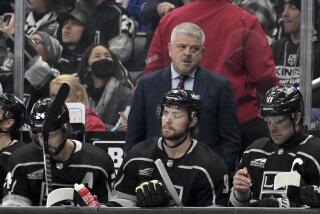With players’ union objecting, NHL realignment plan is shelved
Hostility between the NHL and the NHL Players’ Assn. erupted Friday, eight months before their labor agreement expires but apparently not too soon for each side to claim moral high ground and court public sympathy.
The first salvo was fired by the NHL, which announced it will not implement the realignment and revised playoff format its Board of Governors had approved for the 2012-13 season. Deputy Commissioner Bill Daly said in a statement that the union “unreasonably refused” to approve the plan and the league will now “evaluate all of our available legal options.”
NHLPA Executive Director Donald Fehr, in a statement issued by the union, said players couldn’t accept the proposal by the league’s Friday deadline because the NHL did not address two major concerns: that the creation of two seven-team conferences and two eight-team conferences would be unfair because teams in smaller conferences would have a better chance to qualify for the playoffs, and that realignment would create “increased and more onerous travel.”
Fehr said the league rejected the union’s request to see a draft of the 2012-13 schedule and would not discuss players’ concerns about making longer trips and more crossings of the U.S.-Canada border. The new format differs from the current setup in that it calls for all of the league’s teams to play one another in home-and-home series.
“We continue to be ready and willing to have further discussions should the league be willing to do so,” Fehr said.
Realignment, approved a month ago, was spurred by the Atlanta Thrashers’ move to Winnipeg, Canada, before this season, a shift that occurred too late for the newly renamed Winnipeg Jets to be switched out of the Southeast Division. The NHL promoted the change as a way to ensure superstar players would visit every city every season and intensify conference rivalries. The top four teams in each conference would have qualified for the playoffs, and the first two rounds would have been played within each conference.
The current collective bargaining agreement, which expires Sept. 15, requires the league to get the union’s approval for changes to the terms and conditions of players’ employment like those in the NHL’s plan.
Daly said the union had “acted unreasonably in violation of the league’s rights” after the NHL spent nearly a month “attempting to satisfy the NHLPA’s purported concerns.” Because the process delayed the formulation of next season’s schedule, he said, the league would have to keep its current alignment.
There is time for compromise before the 2012-13 schedule must be completed, but there might not be enough willingness to cooperate.
twitter.com/helenenothelen
More to Read
Go beyond the scoreboard
Get the latest on L.A.'s teams in the daily Sports Report newsletter.
You may occasionally receive promotional content from the Los Angeles Times.











